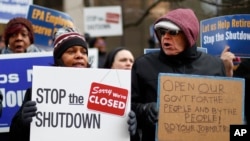The partial closure of the US federal government has caused frustration among American citizens and some Cambodian-Americans living in the United States.
They see the impact of temporary unemployment due to furlough for some government employees, and that other government employees are required to continue working though their pay will be delayed by weeks and perhaps months, and general concerns about livelihoods, rent payments, and other expenses. Some Cambodian-American groups do not support for the government's shutdown, prolonged by a standoff between US President Donald Trump, a Republican, and Democrats over the lack of funding for a wall along the US-Mexico border.
Janet Seng, a resident of Pennsylvania, said the United States should not build a wall, and she supports the Democratic Party's stance.
"First, they want to spend the national budget that does not have to be spent,’’ Janet Seng told VOA Khmer by phone. ‘’Second, we just like to imprison ourselves. So I do not support it," adding that Trump could use different methods to strengthen border security, such as increasing border patrols and placing more security cameras at the border.
She added that Trump effectively is holding citizens hostage, leading Cambodian-Americans to face hardships.
"If it lasts longer, the impact on the lives of people in the United States will be even greater,’’ she said, ‘’because of what he as an individual, and as the president wants to do, what he wants to push forward. So he holds us as hostages. So I'm not satisfied.”
Kuch Schanley, a Cambodian-American in Maryland, said he did not support the government closure and construction of the wall at a cost of more than $5 billion.
"The demand for the money to build the fence, and the Democrats do not agree, and President Donald Trump closes the government; that's a sign of the president's childishness, not taking into account the American lives who work for the federal government,’’ Kuch Schanley said by phone. ‘’I do not support it. Also, building a wall along the American-Mexican border, I do not support, because there are so many ways to be more effective than building this wall if we do not want people to run to the United States illegally along the border.’’
"The shutdown now is [aimed] to defeat the Democrats who do not want to use government money to build a wall or fence, so I think this shutdown makes no sense and it’s a serious danger for those who work in federal government agencies," he said.
Yap Kim Tung, a Cambodian-American in Virginia, said Americans and Cambodian-Americans could feel the consequences because they could not get services from the federal government.
"But when there is no paycheck, sometimes some people do not have the money to pay the bills and pay the other expenses they need,’’ Yap Kim Tung said. ‘’So it might be a problem to make money back.”
He said he did not want to see the government shut down. But despite the problems, he said that if one looks at the core of the system of checks and balances in the state, it demonstrates the democratic process.
"As we know, the president cannot have authoritarian powers... And when the president cannot achieve that, he can divide power with the parliament and the Senate, which is a good thing.”
Yap Kim Tung said the two parties need to work together and negotiate in the days and weeks ahead to reach a solution.
More than 800,000 federal workers have been furloughed or are working without pay. This is one of the longest U.S. federal government shutdowns – partial or full -- in the past 40 years. The president has said he is willing to continue the shutdown "for years" until Congress provides funding for the wall that he promised Mexico would pay for during his presidential campaign.
In the U.S. system of government, Congress votes on and decides and provides financial appropriations for federal government spending.
The shutdown has affected government services around the country and if it continues, experts warn there could be dire consequences. For example, money for the food stamp program, which helps millions of low-income Americans buy food, will expire in March.
Trump and congressional leaders met on Wednesday, but there were no signs they were ready to compromise over the president’s demand for border wall funding.
Trump recently told reporters: "We have to do what's right at our border."
He has said he may declare a national emergency to build the wall without congressional approval, adding, "My threshold will be if I can't make a deal with unreasonable people."
Democrats have offered Trump $1.3 billion in new funding for border security, although none for a wall. But Trump has demanded more than $5 billion for a barrier, which he now says could be steel slats rather than solid concrete.
During his successful run for the White House in 2016, Trump's most fervent supporters cheered his call for a wall that he said Mexico would pay for.
In a rebuttal of Trump’s comments, leading Democrats House Speaker Nancy Pelosi of California and Senator Chuck Schumer of New York derided Trump’s campaign assertion that Mexico would pay for the wall, instead of U.S. taxpayers.
"The president of the United States — having failed to get Mexico to pay for his ineffective, unnecessary border wall, and unable to convince the Congress or the American people to foot the bill — has shut down the government," Schumer said. "American democracy doesn't work that way. We don't govern by temper tantrum."




